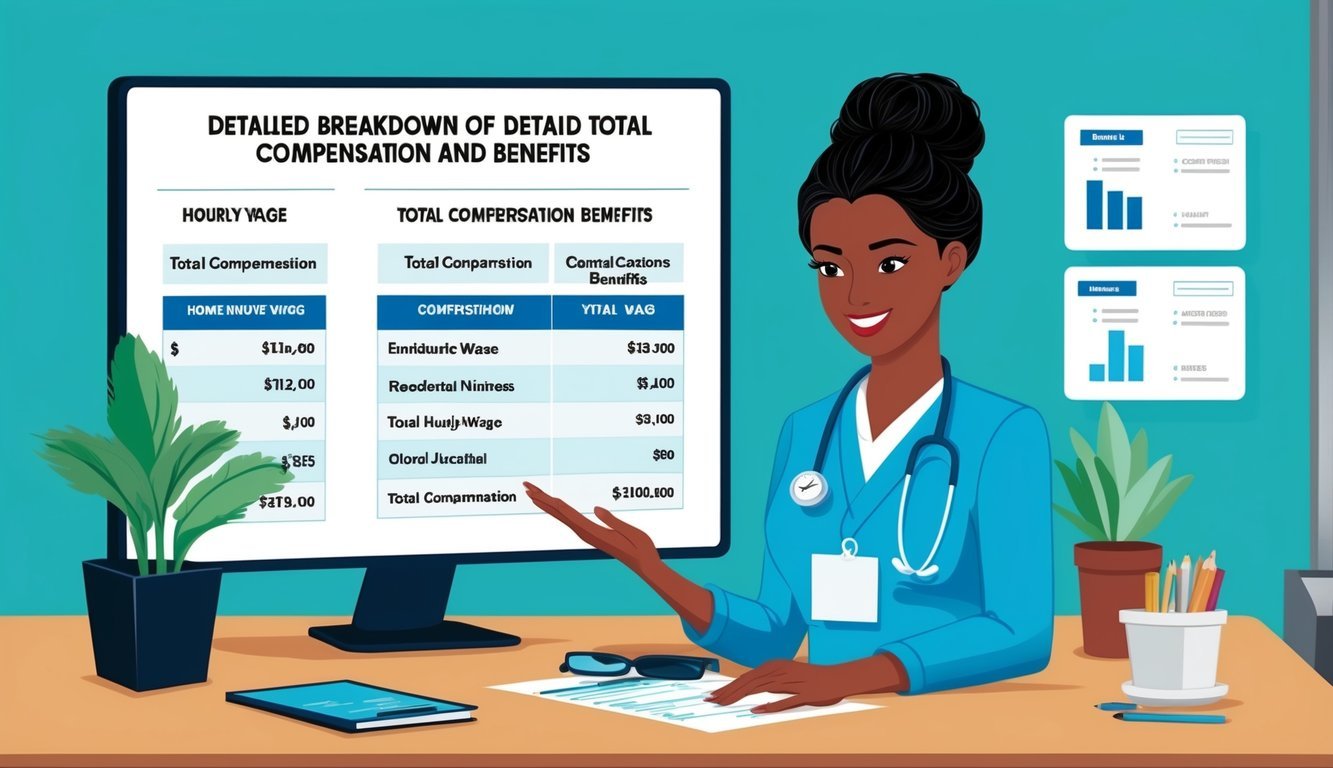Your hourly wage as a registered nurse (RN) can significantly impact your career satisfaction and financial stability.
In 2024, RNs earn about $34.72 per hour on average, though this can vary widely based on location, experience, and other factors.
Understanding these differences can give you a clearer picture of what to expect in this rewarding profession.
Your pay as a nurse isn’t solely about the hourly rate.
Benefits, overtime, and shift differentials can add to your total compensation.
Additionally, trends in the job market can reveal opportunities for higher wages, especially in high-demand areas.
Curious about where you stand in the nursing field? Exploring how much you can expect to make per hour can help you make informed decisions about your career path and negotiations.
Key Takeaways
- RNs have an average hourly wage of $34.72 in 2024.
- Factors like location and experience heavily influence RN salaries.
- Total compensation includes more than just the hourly wage.
Understanding the Basics of RN Compensation
Registered nurses (RNs) play a crucial role in the healthcare system.
To understand their compensation, it’s essential to define their roles and the impact of different nursing degrees on their salaries.
Defining Registered Nurse (RN) Roles
As a registered nurse (RN), you are responsible for patient care, medical assessments, and assisting doctors during treatments.
Your duties can vary based on the healthcare setting, including hospitals, clinics, or schools.
RNs may also specialize in areas like pediatrics, geriatrics, or emergency care.
This specialization can influence your salary.
According to various sources, the average hourly pay for RNs is about $45.42, which translates to an annual salary of roughly $94,480.
The specific amount you earn can depend on factors like your location, experience, and specific role within the medical field.
Overview of Nursing Degrees
To become an RN, you typically need a nursing degree.
There are several paths available:
- Associate Degree in Nursing (ADN): This is usually a two-year program that prepares you for basic nursing tasks.
- Bachelor of Science in Nursing (BSN): This four-year degree can lead to higher pay and more job opportunities.
RNs with a BSN may earn an average salary ranging from $89,010 to $131,309 annually, depending on experience and role.
For example, RNs made around $52.61 per hour with a master’s degree, highlighting the potential for higher earnings with advanced education.
Investing in your education can significantly impact your earning potential as an RN.
You can find more information about RN salaries by state on resources like Nurse.org and NursingProcess.org.
Factors Influencing RN Salaries
Several key elements affect how much a registered nurse (RN) earns.
These include education, geographical location, and years of experience.
Understanding these factors can help you better assess potential earnings in the nursing field.
Education Impact on Earnings
Your level of education significantly influences your salary as a registered nurse.
Generally, those with a Bachelor of Science in Nursing (BSN) earn more than entry-level RNs who hold an Associate Degree in Nursing (ADN).
Here’s a comparison of average salaries based on education:
| Degree Level | Average Salary |
|---|---|
| Associate Degree (ADN) | $65,000 |
| Bachelor’s Degree (BSN) | $75,000 |
| Master of Science in Nursing (MSN) | $95,000 |
Advanced degrees, like an MSN, open the door to higher-paying positions, such as nurse practitioners.
Investing in further education can enhance your career and earnings.
Geographical Variations in Pay
Your location plays a crucial role in determining your salary.
States with higher living costs often offer higher pay rates for RNs.
For example, here’s a look at average RN salaries by state:
| State | Average Salary |
|---|---|
| California | $102,700 |
| Texas | $75,000 |
| Florida | $70,000 |
| Oregon | $97,000 |
California and Hawaii are known for their high RN salaries.
Understanding the salary differences across states can help you make informed decisions about where to work.
Years of Experience and Advancement
Experience is another important factor influencing RN salaries.
Entry-level registered nurses typically earn less, while those with several years in the field can command significantly higher wages.
For instance, here’s a breakdown of salary ranges based on experience:
| Experience Level | Average Salary |
|---|---|
| Entry-Level (0-1 year) | $60,000 |
| Mid-Level (2-5 years) | $75,000 |
| Experienced (5+ years) | $85,000 and above |
As you gain experience and possibly advance to supervisory roles, your earning potential increases.
Traveling nurses usually receive higher pay rates, reflecting their flexibility and skills.
Current RN Salary Trends

Understanding current salary trends for registered nurses (RNs) helps you navigate your career options.
RNs’ earnings vary based on factors like location and experience.
The following sections provide detailed insights into salary data from reputable sources.
Data from the Bureau of Labor Statistics
The U.S. Bureau of Labor Statistics reports that the average annual salary for RNs is approximately $80,010, which breaks down to about $38.46 per hour.
This figure reflects salaries across various regions and experience levels.
The demand for RNs continues to grow due to an aging population and healthcare needs.
As a result, salaries increased by about 15% from 2019 to 2022.
This trend illustrates a positive outlook for job security and income growth in the nursing profession.
State-by-State Salary Comparison
Salaries for RNs vary significantly by state.
Here are some average hourly wages from select states:
| State | Average Hourly Wage |
|---|---|
| California | $77.66 |
| Hawaii | $55.99 |
| Alaska | $49.67 |
| Oregon | $51.12 |
| Florida | $33.78 |
California offers the highest pay at $77.66 per hour, influenced by the state’s high cost of living and demand for healthcare services.
On the other hand, states like Florida have lower average salaries but still provide good opportunities.
For more state-specific information, visit NursingProcess.org.
Percentile Wage Estimates and Total Earnings
Percentile wage estimates show the variation in RN salaries based on experience and expertise.
For example:
- 10th Percentile: $28.06 per hour
- 25th Percentile: $34.50 per hour
- 50th Percentile (Median): $42.80 per hour
- 75th Percentile: $54.57 per hour
- 90th Percentile: $67.98 per hour
Your total earnings can also be influenced by overtime, bonuses, and specializations. Nurse practitioners earn more on average, reflecting advanced skills and responsibilities.
In high-demand areas, RNs can see higher total earnings.
Detailed Look at RN Hourly Wages
When considering a career as a registered nurse, understanding hourly wages is essential.
Key factors influencing pay include the average hourly rates, variations due to overtime, and possible shift differentials.
Understanding Average Hourly Pay Rates
The average hourly pay for registered nurses can vary significantly based on location, experience, and type of facility.
As of 2024, the national average RN salary is approximately $45.42 per hour, which translates to about $94,480 per year.
Here’s a brief overview of RN pay in different states:
| State | Average Hourly Wage |
|---|---|
| Mississippi | $32.66 |
| Alabama | $31.70 |
| California | $66.11 |
| Texas | $37.87 |
In Mississippi, entry-level RNs start at around $24.03 per hour.
With experience, pay can rise to $30.45 after five to nine years, and approximately $40.40 after 20 years.
For insights on pay in various states, you can visit Nurse.org.
Overtime and Shift Differentials
Many RNs work overtime or on different shifts, which can affect their hourly earnings.
Overtime typically pays one and a half times the regular rate.
This means if your regular rate is $45.42, your overtime pay could be around $68.13 per hour.
Shift differentials reward nurses who work evening or night shifts, which can also boost their earnings.
It’s common for facilities to offer an additional $1 to $5 per hour for these shifts.
These additional pay rates can significantly impact annual earnings.
If you are considering taking extra shifts or working overtime, understanding these factors can help maximize your potential income as a registered nurse.
Beyond the Hourly Wage: Total Compensation and Benefits

When considering the earnings of a Registered Nurse (RN), it’s important to look beyond just the hourly wage.
Benefits and compensation packages play a significant role in the overall value of a nursing career.
Here are key aspects that contribute to total compensation.
Healthcare Benefits and Pensions
One major component of total compensation for RNs is healthcare benefits.
Many employers offer comprehensive health insurance plans that cover medical, dental, and vision care.
These benefits can save you substantial out-of-pocket expenses.
For example, a typical health plan may cover:
- Preventive care: Routine check-ups and vaccinations
- Prescription drugs: Discounts or copays for medications
- Mental health services: Support for emotional well-being
In addition to health insurance, many employers provide pension plans or retirement savings options.
These can include 401(k) plans with employer matching, which helps build your financial security for the future.
Understanding these benefits is essential to evaluating your overall compensation.
Continuing Education and Career Development Opportunities
Another important aspect of total compensation is support for continuing education and career development.
Many employers recognize the value of ongoing education for their nursing staff.
They often provide resources such as:
- Tuition reimbursement: Financial support for RNs pursuing advanced degrees, like RN-to-BSN programs or even specialized nurse practitioner courses.
- Certification support: Funding for professional certifications that boost your qualifications.
- Workshops and training: Opportunities to enhance skills and knowledge within specific nursing fields.
Investing in your education not only increases your earning potential but also enhances your career satisfaction and job security.
Websites that offer online nursing programs can be valuable resources as you pursue these opportunities.
Frequently Asked Questions
In this section, you will find answers to common questions about the hourly wages and salaries for Registered Nurses in Illinois.
This information is useful for understanding the income range you can expect in different situations.
What is the average hourly wage for a Registered Nurse in Illinois?
The average hourly wage for a Registered Nurse in Illinois is approximately $39.38.
This can vary based on experience, education, and location within the state.
How much does an entry-level Registered Nurse earn per hour in Illinois?
Entry-level Registered Nurses in Illinois typically earn around $29.55 per hour.
This is the starting wage for those just beginning their career in nursing.
What is the salary range for Registered Nurses working in Chicago on an hourly basis?
In Chicago, Registered Nurses make between $34.00 and $50.00 per hour.
Factors influencing this range include the type of facility and the RN’s level of experience.
What are the typical annual earnings for a Registered Nurse in Illinois?
Annual earnings for a Registered Nurse in Illinois average about $81,860.
This figure can shift depending on the specific role, shifts worked, and additional certifications.
How does a Travel Nurse’s hourly income in Illinois compare to a standard RN position?
Travel Nurses in Illinois typically earn a higher hourly rate than standard RNs.
Their pay can range from $45.00 to $100.00 per hour based on demand and location.
What is the highest hourly pay rate for specialized Registered Nurses?
Specialized Registered Nurses can earn up to $60.00 or more per hour.
This high pay is often seen in roles that require advanced skills or certifications, such as Nurse Practitioners or Nurse Anesthetists.

